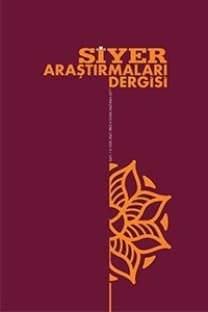Hz. Peygamber Zamanında Medine’de Müslüman-Yahudi İlişkilerini Anlamak
İslamiyet’in ilk yıllarından beri Yahudiler, Müslümanlar açısından en önemli gayrimüslim topluluk olarak sayılmaktaydılar. Çünkü İslam'ın erken döneminde Medine'deki toplulukların çoğunluğunu temsil ediyorlardı. Nitekim Yahudiler, peygamberlik hakkında ön bir bilgiye sahip olmalarına rağmen, Hz. Peygamber’in peygamberliğini reddetmişlerdir. Bu makale, erken dönem İslam Tarihi kaynaklarındaki rivayetleri, Yahudiler hakkındaki ayetleri ve ilgili çalışmaları gözden geçirerek Medine’deki Yahudilerin nasıl muamele gördüğünü açıklamak üzere yazılmıştır. Makalede, Hz. Peygamber’in, karar ve eylemlerinde net duruşunun yanı sıra düşmanları da dahil olmak üzere başkalarına karşı iyi muamelesi ortaya konulmuştur. Makale, Hz. Peygamber’in Yahudilere muamelesi konusunda yeni bir yaklaşım ortaya koymayı iddia etmeksizin rivayetlerin gözden geçirilmesi neticesinde öne çıkan hususları belirli bir düzen içinde sunmayı ve tarihi kayıtları Medine dönemi özelinde değerlendirerek birtakım sonuçlara ulaşmayı hedeflemiştir. Yahudilerle olan ilişkiden çıkarılan en önemli sonuç ise Hz. Peygamber’in onlarla yapılmış olan anlaşmayı son ana kadar koruma niyetinde olduğu ve savaştan kaçındığıdır. Nitekim makalede verilen birbirinden bağımsız üç örnekte de görüldüğü üzere anlaşmayı bozan taraf Yahudiler olmuştur. Bir kez anlaşma bozulunca onlara karşı katı muamele sergilenmiş; yurtlarından sürülüp ölüme mahkûm edilmek suretiyle Müslümanlar güçlerini göstermişlerdir.
Anahtar Kelimeler:
İslam Tarihi, Müslümanlar, Yahudiler, Hz. Muhammed, Medine Sözleşmesi
Understanding Muslim - Jewish Relationship in Medina during the Era of Prophet Muhammad (SAW)
From the first years of Islam, the Jews had been regarded as the most important non-Muslim community for the Muslims because they represented the majority of the communities in Medina. Although their knowledge of prophethood, the Jews are known for their denial of Prophet Muhammad. This paper explains how Prophet Muhammad treated the Jewish in Medina during his era by reviewing narrations in early sources, verses about Jews, and related modern studies. It is shown that Prophet Muhammad practices kindness towards others, including the enemies, as well as practicing firms in his decision and actions. It should be emphasized that the article is not seeking a new claim on the treatment of the Jews in Medina. However, the critical points by reviewing the related traditions were presented in order, and the historical data about the Medina era has been evaluated to reach some findings. The most important one of the findings was that the Prophet intended to keep the agreement with the Jews until the last moment, and he avoided war. However, in three independent examples which are given in the article, the party that broke the agreement was the Jews. Once the contract was broken, they were treated harshly; the Muslims showed their strength by expelling them from their lands and dooming their men to death.
Keywords:
Islamic History, Muslims, Jews, Prophet Muhammad, Medina Treaty,
___
- Abū Yūsuf, Yakûb b. Ibrahim al-Ansārī. Kitāb al-Kharāj. critical ed. Muhammad Abdulhafīz al-Manāsīr. Amman: Dār Kunūz al-Ma‘rifa al-Ilmiyyah, 2009.
- Al-Bukharī, Muhammad b. Ismail. Sahih Al-Bukhari. Beirut, Lubnan: Dar Tawq al-Najah, no date.
- Arslantaş, Nuh. “Hz. Peygamber’in Çağdaşı Yahudilerin Sosyo-kültürel Hayatlarina Dair Bazı Tespitler”, İSTEM 11 (2008), 9-46.
- Britannica, The Editors of Encyclopaedia. “Constitution of Medina”. Encyclopedia Britannica, 28 March 2016, Accessed 4 December 2021. https://www.britannica.com/topic/Constitution-of-Medina.
- Cohen, Mark R. Islamic Policy toward Jews from the Prophet Muhammad to the Pact of ‘Umar, Meddeb, Abdelwahab, and Benjamin Stora, (eds.) A History of Jewish-Muslim Relations: From the origins to the present day. Princeton: Princeton University Press, 2013.
- Firestone, Reuven. “Muhammad, the Jews, and the Composition of the Qur’an: Sacred History and Counter-History’. Religions 10/63 (2019), 1–16. https://doi.org/10.3390/rel10010063
- Gilani, S. M. Yunus - Tazul, Islam. “Religious Conflict in Early Islam: A Study of Its Causes from Qur’an Sunnah Perspective”. International Journal of Quranic Research 6/2 (2014), 1–18. https://doi.org/10.22452/quranica.vol6no2.1
- Hamidullah, Muhammed. İslam Peygamberi. İstanbul: Beyan Yayınları, 2013.
- Ibrahim, Ahmad - El-Qasimy, Dzafir. Piagam Medinah: Pandangan Dan Ulasan. Kuala Lumpur: Gelanggang Kreatif, 1985.
- Muhammad b. Ishāk b. Yasār, Siyar Ibn Ishāq. trans. Muhammed Hamidullah. İstanbul: Düşün Yayıncılık, 2012.
- Rohaily, Al-Jawhary. Muhammad Rasul Terakhir. ed. Mohd Nor Masniza. Batu Caves, Selangor, Malaysia: Must Read Sdn. Bhd., First Edit., 2020.
- Tabarī, Ibn Jarīr. Taʾrīkh al-Tabarī. trans. Cemalettin Saylık. 4 Volume. Ankara: Ankara Okulu Yayınları, 2019.
- Wensinck, A.J. and Crone, P., “Mawlā”, in: Encyclopaedia of Islam, Second Edition, Edited by: P. Bearman, Th. Bianquis, C.E. Bosworth, E. van Donzel, W.P. Heinrichs. Consulted online on 03 October 2021 http://dx.doi.org/10.1163/1573-3912_islam_COM_0714
- Watt, W. Montgomery, “ʿAbd Allāh b. Ubayy”, in: Encyclopaedia of Islam, Second Edition, Edited by: P. Bearman, Th. Bianquis, C.E. Bosworth, E. van Donzel, W.P. Heinrichs. Consulted online on 03 October 2021 http://dx.doi.org/10.1163/1573-3912_islam_SIM_0065
- Yayla, Mustafa. “Islam and Tolerance: A Need for a Contemporary Madinah Constitution”. Journal of Human Sciences 13 (2016), 2431-2440.
- Yılmaz, Hüseyin. “Medine Sözleşmesi Bağlamında Birlikte Yaşama Kültürü”. Cumhuriyet İlahiyat Dergisi 25 (2021), 239-258.
- Zaleha, Embong et al. “Analysis of Ethnic Relations in the Medina Charter”. International Journal of Academic Research in Business and Social Sciences 10/10 (2020), 22–31. https://doi.org/10.6007/ijarbss/v10-i10/7895
- Zaleha, Embong. “Conflict Management in the Constitution of Medina: An Analysis”. International Journal of Academic Research in Business and Social Sciences 8/12 (2018), 396–414. https://doi.org/10.6007/ijarbss/v8-i12/5041
- Zuhrī, Ibn Shihāb. al-Maghazī. trans. Mehmet Nur Akdoğan. Ankara: Ankara Okulu Yayınları, 2016.
- ISSN: 2547-9822
- Başlangıç: 2017
- Yayıncı: Siyer Yayınları
Sayıdaki Diğer Makaleler
Gazve ve Seriyyeler Açısından Hz. Peygamber’in Hayatı
Hz. Muhammed'in Hıristiyanlarla İlişkileri (İslami Bir Bakış Açısı)
Hz. Peygamber'in Eşleri ve Çocukları
Hicretin Habercisi Olarak Akabe Biatları’nın Yeri ve Önemi
Hz. Peygamber Zamanında Medine’de Müslüman-Yahudi İlişkilerini Anlamak
Farhana BİNTİ IDERİS, Öznur ÖZDEMİR
Hz. Muhammed'in Hıristiyanlarla İlişkileri (İslami Bir Bakış Açısı)
İbn İshak’ın Sîre’si Özelinde Hz. Muhammed’in Risalet Öncesi Hayatı
